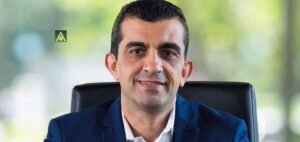Adapting to Change and Leading with Insight in a Competitive Landscape!
Organizations today face mounting pressures to adapt and innovate. The challenge of balancing risk management with growth strategies can often leave companies at a crossroads, unsure of which direction to take. Meet Sultan Sindi, the Chief Financial Officer of United Cooperative Assurance (UCA), whose expertise and vision steer the company towards a prosperous future.
Sultan’s journey began during his undergraduate studies, where he discovered a profound passion for finance. This initial spark ignited a career that would see him navigate the complexities of investment banking and private equity, participating in transactions exceeding USD 3 billion. His early experiences laid a strong foundation, enabling him to tackle diverse challenges across various sectors, including insurance, retail & distribution finance, and the development of mega projects like the AlUla World Heritage site.
With an MBA from London Business School and an impressive array of professional certifications, CFA, FRM, CAIA, and FMVA, Sultan embodies the blend of academic rigor and practical experience. Sultan’s extensive background drives him to lead UCA through financial transformation and the challenges that come with strategic growth initiatives. Under his stewardship, UCA is not just responding to market demands; it is setting new benchmarks for financial excellence.
Sultan’s leadership style emphasizes collaboration and innovation. He believes that fostering a culture of transparency and accountability is essential for driving sustainable growth. By leveraging his cross-industry insights, he is redefining what it means to be a CFO in today’s dynamic environment. He was recognized as one of the “Global 200 Power Leaders in Finance for 2024,” highlighting his significant impact in the finance sector. As UCA continues to thrive under Sultan’s guidance, it becomes clear that with the right leadership, even the most daunting challenges can be transformed into remarkable opportunities for growth and success.
Below are the interview highlights:
Can you describe a key achievement in your career that you believe sets you apart as a visionary CFO?
Amongst the many key achievements, one that I’m notably proud of was leading the development and execution of Bupa Arabia’s 5-year plan, a testament to my strategic planning skills. Our primary goal was to achieve a specific bottom line within that time frame.
We took a comprehensive approach, focusing on every item within the P&L and setting clear KPIs and accountabilities across all responsible departments. We maintained alignment and progress toward our financial targets by ensuring each department had defined objectives and conducting regular follow-ups. I’m happy to say that the 5-year plan materialized, and the goals were met, demonstrating the success of our focused strategy and collaborative effort.
How do you approach strategic planning within your organization, and what methodologies do you employ?
Strategic planning is a cornerstone of success, both in the short and long term. As the Executive Director for Financial Planning & Analytics at the Royal Commission for AlUla, I led the effective completion of the 2024 budget process. We implemented an automated budgeting tool that significantly reduced manual effort whilst enhancing our control over the entire process.
Additionally, we gathered, challenged, and refined the budget requirements for 29 departments to align with the Ministry of Finance’s expectations.
This innovation enabled us to complete the budget ahead of the Ministry’s deadlines, a first for the organization, and reassured us of our ability to meet strict regulatory compliance with competing priorities. I use technology to streamline processes, ensuring that strategic planning is efficient and aligned with the organization’s broader goals, instilling confidence in our ability to deliver on time.
In what ways do you support technology and data analytics to handle financial performance and decision-making?
Technology and data analytics are vital in modern finance. Throughout my career, I’ve emphasized the use of advanced systems and data-driven approaches to improve financial performance. At Bupa Arabia, for instance, I rolled out key projects such as the SME Auto Flagging and SME Advanced Payment Amendment systems, which significantly improved collection processes and performance and overall cash flow management.
I believe in leveraging data analytics to monitor KPIs and predict future trends, ensuring that we make informed, strategic decisions that drive the organization’s financial success.
What are the most significant challenges you foresee for CFOs in 2024, and how do you plan to address them?
One of the significant challenges for CFOs in 2024 will be navigating economic uncertainty, including inflationary pressures, shifting regulatory landscapes, and declining interest rates, which could impact both liquidity and investment returns. Additionally, the increasing importance of ESG compliance will require adaptability.
To address these challenges, I plan to focus on strengthening liquidity management, enhancing cost control measures, and investing in digital transformation to ensure operational efficiency and compliance. By aligning financial strategy with sustainable growth and maintaining a proactive approach to market changes, I aim to build resilience and agility in uncertain times.
How do you balance short-term financial goals with long-term strategic objectives?
Balancing the organization’s immediate needs, together with short-term and long-term goals requires a clear understanding of the organization’s vision and operational realities. I focus on ensuring robust cash flow management and liquidity for immediate needs while setting long-term financial targets that align with our broader strategy.
For instance, I launched a modern-day finance department at UCA that improved day-to-day financial performance whilst supporting long-term growth through strategic investments, in compliance with regulatory standards.
What role does sustainability play in your financial strategy, and how do you integrate ESG principles into your operations?
Sustainability is a core factor in financial strategies. We are exploring ways to integrate ESG principles into our corporate governance, business strategies, risk management, business processes, and compliance frameworks. With the upcoming inclusion of ESG reporting standards within the IFRS framework, we are preparing to align our financial reporting to these new standards.
We aim to ensure that UCA is fully compliant with regulations while positioning ourselves as a forward-thinking organization with a strong focus on sustainability.
Can you share an example of how you’ve fostered innovation within your finance team or organization?
Innovation within the finance function is crucial for staying competitive. At the Royal Commission for AlUla, beyond reducing manual effort, the automated budgeting tool enhanced strategic financial planning by providing more timely and actionable insights. It also improved accountability, as department heads could track budget changes in real-time, allowing for more accurate forecasting and better resource allocation. At Bupa Arabia, I deployed multiple systems, including the SME Auto Flagging and SME Advanced Payment Amendment systems, which significantly reduced collection risks from our SME clients.
These innovations and restructuring of financial processes to align with modern practices fostered a culture of continuous improvement, driving both efficiency and performance within my finance teams. By embracing digital transformation and targeted solutions, I ensured that the finance departments stayed agile and forward-thinking.
What strategies do you take on to attract, retain, and develop talent within your finance team?
Attracting and retaining top talent is essential to building a high-performing finance team. I focus on creating an inclusive and supportive environment that fosters professional development. At Bupa Arabia, for example, I implemented the Finance People Agenda in 2020, which significantly improved employee engagement.
Despite the challenges posed by the COVID lockdowns, I increased our engagement score from 65 to 80 within a year, with the Finance Department achieving the largest increase in engagement across the company. I also prioritize clear communication, setting measurable KPIs, and providing opportunities for growth through continuous learning, mentorship, and structured development programs.
How do you view the advancing role of the CFO in today’s business era, particularly in relation to digital transformation?
The role of the CFO has evolved significantly, moving beyond traditional financial management to becoming a strategic partner in driving digital transformation and innovation. Today’s CFOs must leverage technology to streamline financial processes, improve data-driven decision-making, and ensure compliance in a fast-changing environment.
At UCA, I introduced ERP systems that modernized financial operations and improved efficiency across the organization. Similarly, at the Royal Commission for AlUla, I implemented an automated budgeting tool that not only reduced manual effort but enhanced the accuracy of our financial processes and also reduced the lead time to generate our Quarterly Budget Execution reports from two months to just three weeks after a quarter’s close, which helped the Organization make more timely decisions.
What advice would you give to aspiring CFOs looking to make their mark in the finance industry?
My advice is to embrace financial and operational leadership proactively. Mastering the fundamentals of financial management is essential, but understanding how to drive business transformation and navigate regulatory landscapes is equally important.
Continuous learning is critical, particularly in risk management, data analytics, and technology. Building solid relationships with key stakeholders within and outside the organization will also play a significant role in long-term success.
Looking ahead, what are your personal goals for the next year as a CFO, and how do they align with your organization’s vision?
Over the next year, I aim to further modernize UCA’s financial operations by continuing to enhance our technology stack and investment strategy to ensure continued growth. I also aim to deepen our focus on risk management and regulatory compliance to safeguard the organization’s long-term health. I will also continually strive to mentor and develop our finance capabilities through stewardship and one-on-one development programs
These goals align with UCA’s vision of becoming a leading player in the Saudi insurance industry by driving innovation and maintaining strong financial performance.




